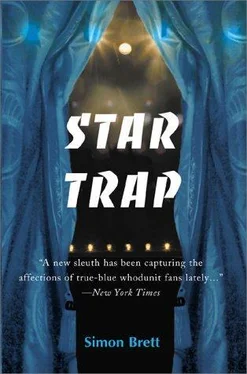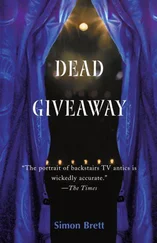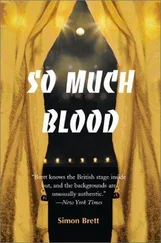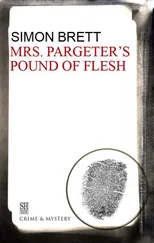Simon Brett - Star Trap
Здесь есть возможность читать онлайн «Simon Brett - Star Trap» весь текст электронной книги совершенно бесплатно (целиком полную версию без сокращений). В некоторых случаях можно слушать аудио, скачать через торрент в формате fb2 и присутствует краткое содержание. Жанр: Классический детектив, на английском языке. Описание произведения, (предисловие) а так же отзывы посетителей доступны на портале библиотеки ЛибКат.
- Название:Star Trap
- Автор:
- Жанр:
- Год:неизвестен
- ISBN:нет данных
- Рейтинг книги:5 / 5. Голосов: 1
-
Избранное:Добавить в избранное
- Отзывы:
-
Ваша оценка:
- 100
- 1
- 2
- 3
- 4
- 5
Star Trap: краткое содержание, описание и аннотация
Предлагаем к чтению аннотацию, описание, краткое содержание или предисловие (зависит от того, что написал сам автор книги «Star Trap»). Если вы не нашли необходимую информацию о книге — напишите в комментариях, мы постараемся отыскать её.
Star Trap — читать онлайн бесплатно полную книгу (весь текст) целиком
Ниже представлен текст книги, разбитый по страницам. Система сохранения места последней прочитанной страницы, позволяет с удобством читать онлайн бесплатно книгу «Star Trap», без необходимости каждый раз заново искать на чём Вы остановились. Поставьте закладку, и сможете в любой момент перейти на страницу, на которой закончили чтение.
Интервал:
Закладка:
But it was one stray positive thought in a scrambled mind. Everything else circled round uselessly, tangling with emotions and producing nothing.
The Queen’s Theatre, Brighton, was one of the great old touring theatres of Britain. It had been built for more spacious times, in the 1870s, before the cinema had cheapened illusion by comparisons with the real thing. When the Queen’s was put up, people went to the theatre for spectacle and they got it. Entertainments were built round special effects — shipwrecks, fires and falling buildings, magic, ghosts and live animals. And the theatres were designed to cope.
The original stage machinery had been built for the Rise and Sink method of set changing, whereby the stage was made up of separate narrow sections, which could be raised and lowered with different sets on them by an elaborate system of pulleys and counterweights. There was a cellar below the stage as deep as the proscenium was high and above the audience’s sight lines there was equivalent space in the flying gallery. The complex of girders and hawsers in the cellar was a feat of engineering comparable to one of the great Victorian railway bridges.
When the stage was designed, it had been equipped with the full complement of trap doors which were written into many plays of the period. Downstage were the corner traps, small openings used for the appearance or disappearance of one actor. Often these would be used as Star Traps, so called because the aperture was covered with a circle made up of triangular wooden segments like cake slices, hinged with leather on the outside, which would open like a star to deliver the actor on to the stage and then fall back into place.
Then there was the Grave Trap centre stage, which was always used for the Gravediggers’ scene in Hamlet. And originally the theatre had had the most elaborate trap of all, the Corsican Trap, or Ghost Glide. This had been developed for the 1852 play The Corsican Brothers and enabled a ghost to rise from the grave as he moved across the stage.
Charles found it fascinating. He had always been intrigued by the mechanics of theatre and just being in the old building gave him that pleasantly painful feeling of hopeless nostalgia which always comes from the knowledge that, however much one exercises the imagination, however much one researches, it is never possible to know what earlier times were really like. He picked the brains of Len, the stage doorman, about the theatre’s history and tried to spend as much time as he could alone there, sensing the building’s past, hearing echoes of old triumphs, tantrums and love affairs.
But it was not easy to indulge this sentimentality. For one thing, the theatre had undergone many changes. The divided stage had been replaced in the forties and now most of the old equipment was boarded over. Only the Star Trap on the fore-stage was still kept working for the annual pantomime appearances of the Demon King (complete no doubt with miscued puff of smoke).
Then again the frantic re-rehearsal schedule for Lumpkin! was not conducive to luxuriating in nostalgia. But, most of all, the looming problem of what should be done about his knowledge of Christopher Milton’s criminal activities kept Charles’ mind naggingly full.
As in the other towns of the tour, the local press greeted the arrival of Lumpkin! in Brighton with a big spread about the show’s star. There was a photograph of Christopher Milton in one of his lovable poses and the column was headed ‘BACK TO SCHOOLDAYS FOR LIONEL WILKINS’. Intrigued, Charles read on.
Lovers of television’s Straight Up, Guv are in for a surprise this week at the Queen’s Theatre when they see the show’s lovable star Christopher Milton in a different role as an eighteenth-century rogue by the name of Tony Lumpkin.
‘Actually, he’s not that different from Lionel,’ confides boyish 34-year-old Christopher. ‘They’re both con-men. I think, if anything, Tony Lumpkin is slightly more successful than Lionel. Well, let’s face it — that wouldn’t be difficult.’
Offstage, Christopher Milton is nothing like his bungling television counterpart. He is a hard-working performer with a great belief in the live theatre. ‘Television is strange,’ he muses. ‘It’s in one way the most intimate of the media, because everything you do on it is very small, you know, just for the camera, and because the viewers are just sitting in their living-rooms to watch. And yet in a strange way, for the performer, it’s a distant feeling playing to a camera, even when there’s a studio audience. It doesn’t bear comparison with the contact you can get with a live theatre audience. That’s electrifying, intoxicating, magic.’
For Christopher, being in Brighton is almost like coming home. ‘I spent seven years of my life here at Ellen da Costa’s Stage School. I came when I was a very young ten-year-old and left when I went into full-time professional theatre. In many ways, Ellen taught me all I know. I think she’s retired now, but I certainly hope to see her while I’m in Brighton. I hope she’ll come and see the show — and no doubt rap me over the knuckles for sloppy enunciation! She used to be very hot on enunciation. I can’t think that she’d approve of Lionel Wilkins’ style of speech…’
The article went on to complete the plug for Lumpkin! with information about Carl Anthony and Micky Gorton. It made no mention of Mark Spelthorne’s death. But then the whole thing read like an Identikit PR interview which had been prepared long in advance.
Still, the information about the stage school was interesting. If the key to Christopher Milton’s behaviour lay deep in his past, then it might be worth paying a visit to Miss Ellen da Costa.
The rehearsals were hard. They started with a ten-thirty call on the Monday morning and it was like working on a new show. Wally Wilson’s typewriter had been busy and few scenes had escaped ‘improvement’. The charming cadences of Goldsmith’s lines had now completely vanished and were replaced by the staccato banality of television comedy. There was more work for everyone. At enormous cost, the band had special rehearsals with Leon Schultz. The choreographer kept snaffling dancers away to learn new routines in the theatre bar. Actors were rarely seen without scripts in their hands as they tried to flush the old lines out with the new. Wherever there was a piano it was surrounded by a knot of actors struggling to pick up altered songs. The atmosphere was one of intense pressure.
But surprisingly it was cheerful. The company seemed more united than ever. And this was almost solely due to Christopher Milton. His enthusiasm was infectious and he inspired everyone to greater and greater efforts, he made them think that they were working on the greatest show that had ever happened and that every change was only going to make it that much greater. Charles could not help admiring the Pied Piper strength of the man’s personality. The company was carried along on the wave of his vitality. Even the previous doubters, like Winifred Tuke, made no more comments on the evisceration of Oliver Goldsmith. The triumph of the Christopher Milton was total.
He was everywhere. David Meldrum no longer even made a pretence of directing. He acted as a glorified messenger boy for the star, organising rehearsal schedules as instructed and fixing the details of the increasingly elaborate technical side of the show.
Christopher Milton shared Charles’ fascination for the mechanics of theatre and seemed to feel the magic of the old building. But he didn’t just want to stand and dream while a sense of history seeped into him; he wanted to recapture that history and recreate the splendours of Victorian illusion. The Star Trap was quickly enlisted into the Chase sequence to fire Tony Lumpkin on to the stage from the bowels of the earth. (It was hoped to accompany this entrance with a flash from an electrically-fired maroon, but with the IRA bombers again in action, managements were nervous of sudden bangs in their theatres.) Moments later, Tony Lumpkin descended from the flies on a Kirby wire, then shot behind a tree only to reappear within seconds (thanks to the judicious use of a double) rising from the Grave Trap flanked by two eighteenth-century go-go dancers. The sequence was a far cry from She Stoops to Conquer, but it was moving towards the Chaplinesque quality the star wanted. Of course as the business got more and more detailed, so it expanded and yet more of the original plot had to be cut to accommodate it. At the current rate of progress, by the time the show got to London it would have no more substance than a half-hour episode of Straight Up, Guv. ‘This week lovable con-man Lionel Wilkins fools some supporting actors into believing that a private house is a pub — with hilarious consequences.’
Читать дальшеИнтервал:
Закладка:
Похожие книги на «Star Trap»
Представляем Вашему вниманию похожие книги на «Star Trap» списком для выбора. Мы отобрали схожую по названию и смыслу литературу в надежде предоставить читателям больше вариантов отыскать новые, интересные, ещё непрочитанные произведения.
Обсуждение, отзывы о книге «Star Trap» и просто собственные мнения читателей. Оставьте ваши комментарии, напишите, что Вы думаете о произведении, его смысле или главных героях. Укажите что конкретно понравилось, а что нет, и почему Вы так считаете.












